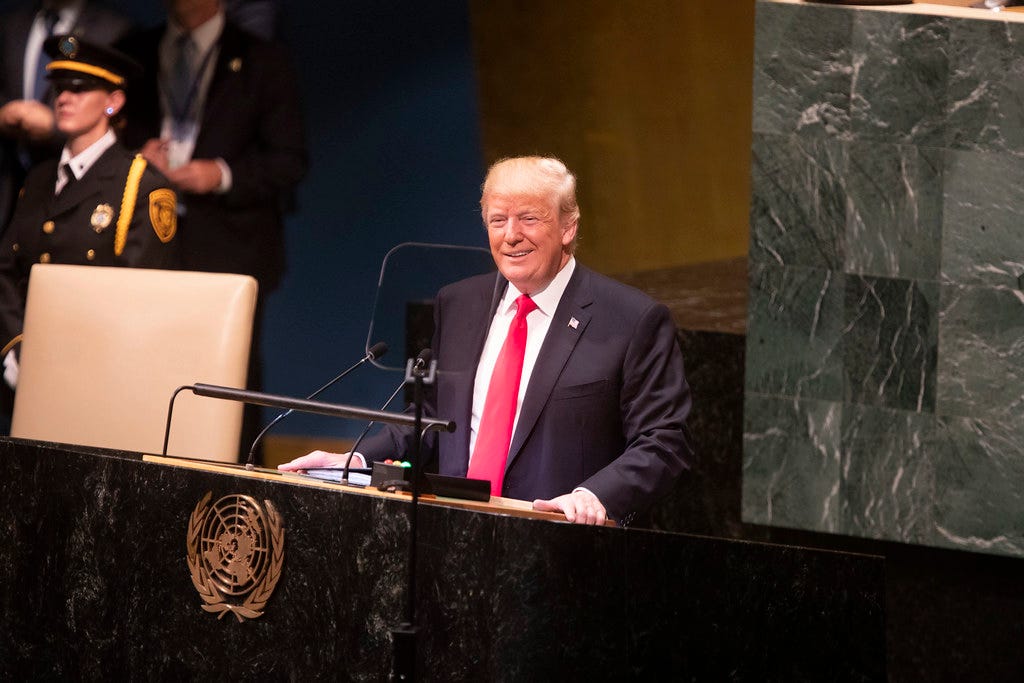Americans Reject Trump’s Nobel Peace Prize Claims as Poll Shows 76% Opposition.
A Washington Post survey reveals that Americans doubt the president’s diplomatic success, despite his Republican supporters disagreeing about his international performance.
A Washington Post-Ipsos survey shows that 76 percent of Americans reject President Donald Trump’s Nobel Peace Prize claims despite his repeated statements about earning the award. The survey results show that 76 percent of Americans reject Trump’s Nobel Peace Prize bid, while 22 percent support his candidacy. The survey results emerged immediately after Trump delivered his advocacy for the Nobel Peace Prize at the United Nations General Assembly.
The Republican voter base shows an unexpected lack of agreement about Trump’s Nobel Prize qualifications.
The Republican Party demonstrates significant disagreement about whether Trump should receive the Nobel Prize. The survey shows that Republican voters are equally divided about his Nobel Prize candidacy, with 49 percent supporting him and 49 percent not. The president faces opposition from his core political supporters who doubt his diplomatic success.
The president receives minimal backing from both independent voters and Democratic supporters.
The survey reveals that 14 percent of independent voters and 3 percent of Democrats support Trump’s candidacy for the Nobel Peace Prize. The numbers suggest that the president lacks support from his base regarding his key foreign policy achievements.
Public skepticism about Trump’s handling of major international conflicts is evident in the survey results.
The survey results demonstrate that Americans strongly disapprove of Trump’s management of major international conflicts. The survey shows that 60 percent of Americans disapprove of Trump’s Russia-Ukraine war management, and 58 percent disapprove of his handling of the Israel-Hamas conflict.
The public evaluates Trump’s foreign policy performance through a negative perspective, which differs from his self-assessment. The public perception of his diplomatic success stands in direct opposition to his speech at the UN, where he presented an alternative view of his accomplishments.
UN Speech Renews Prize Push
During his address to the UN General Assembly on Tuesday, Trump reiterated his standard claim about resolving multiple global conflicts. The president presented seven “raging” wars, which he stated he had settled since his return to office.
The president presented his list of seven conflicts to the UN delegates, which included Cambodia and Thailand, Kosovo and Serbia, the Congo and Rwanda, Pakistan and India, Israel and Iran, Egypt and Ethiopia, and Armenia and Azerbaijan.
The president finished his speech by boasting that multiple people had informed him he should receive the Nobel Peace Prize for each of his accomplishments.
The fact-checking team at CNN discovered multiple inaccuracies in the statements Trump made during his speech. The news organization proved that Trump could not have brokered peace between Egypt and Ethiopia because these countries were not at war during his presidency.
Macron Delivers Sharp Rebuke
French President Emmanuel Macron delivered the most direct criticism of Trump’s Nobel Prize aspirations through his BFMTV interview on Tuesday. The announcement of Palestinian statehood recognition by the United Kingdom, France, and Canada faced opposition from Trump, who had previously blocked this move.
Macron stated that Trump’s claim that Palestinian recognition would reward Hamas was completely incorrect while demanding that the president demonstrate actual peace efforts to win the Nobel Peace Prize.
The United States president actively works for peace while seeking the Nobel Peace Prize, according to Macron; however, the prize requires him to end the ongoing conflict. The Nobel Peace Prize remains out of reach for you because you continue to wage war, according to Macron.
Historical Context Complicates Trump’s Case
The Nobel Peace Prize has been awarded to three U.S. presidents who served while in office: Theodore Roosevelt in 1906 for Russo-Japanese War mediation, Wilson in 1919 for League of Nations establishment, and Obama in 2009. The Nobel Peace Prize awarded to Jimmy Carter in 2002 came after his presidency ended more than twenty years prior, in recognition of his humanitarian work and efforts in conflict resolution.



